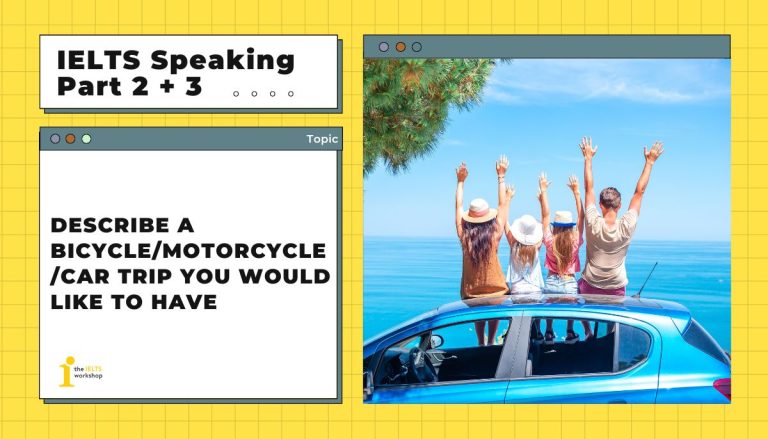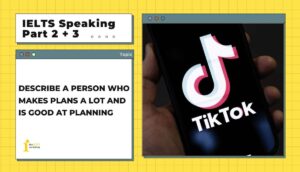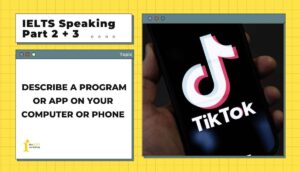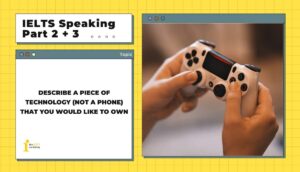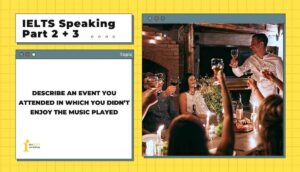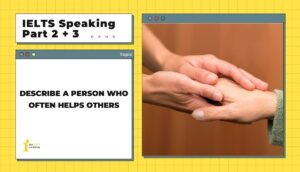Trong bài giải mẫu lần này, thầy Thanh Tùng của The IELTS Workshop sẽ hướng dẫn bạn trả lời topic “Describe a bicycle/motorcycle/car trip you would like to have“ trong IELTS Speaking Part 2. Cùng tham khảo sample, từ vựng và một vài cách diễn đạt ghi điểm trong phần thi IELTS Speaking nhé.
Part 2: Describe a bicycle/motorcycle/car trip you would like to have
Describe a bicycle/motorcycle/car trip you would like to have
You should say:
Who you would like to go with
Where you would like to go
When you would like to go
And explain why you would like to go by bicycle/motorcycle/car
Dưới đây là bài mẫu cho topic “Describe a bicycle/motorcycle/car trip you would like to have”.
1. Bài mẫu (Sample)
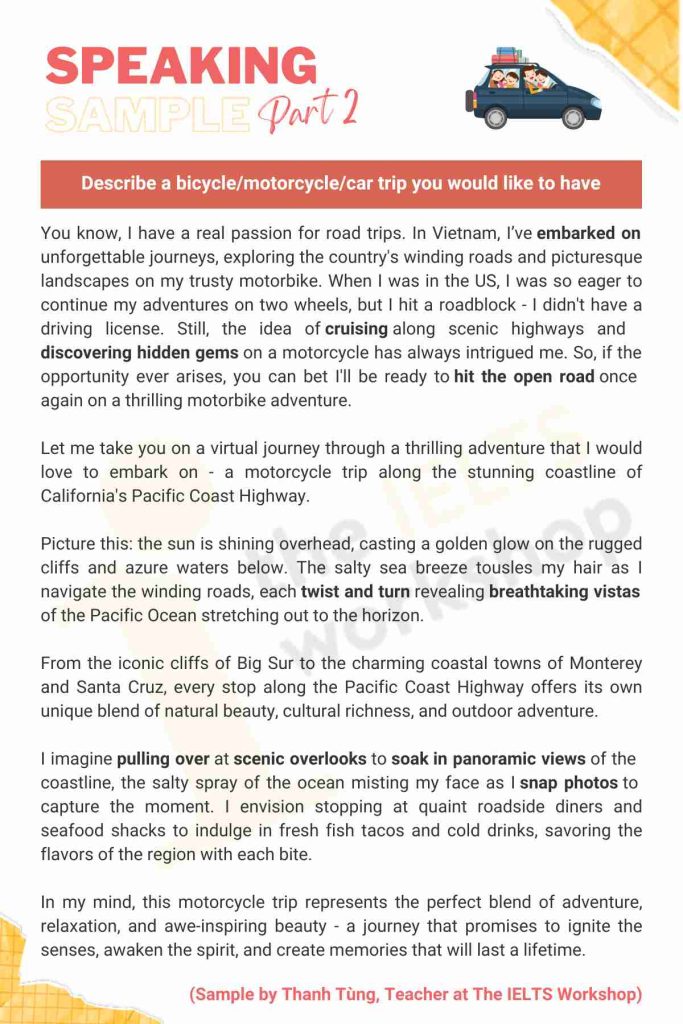
2. Từ vựng (Vocabulary)
- to embark on (V) /ɪmˈbɑːrk ɒn/: to start or undertake a journey, adventure, or new experience – khởi hành, lên đường
- to cruise (V) /kruːz/: to travel smoothly and effortlessly for pleasure, often by vehicle or boat – đi phượt, đi lượn
- a hidden gem (N) /ˈhɪdən dʒɛm/: something outstanding, valuable, or beautiful that is not widely known or recognized – điểm đến đẹp ít người biết đến, vẻ đẹp ẩn giấu
- to hit the road (V) /hɪt ðə ˈəʊpən roʊd/: to start a journey or adventure, especially by driving on highways or rural routes – lên đường, khởi hành
- twist and turn (N) /twɪst ənd tɜːn/: a series of bends or curves in a road or path – lối đi quanh co
- a vista (N) /ˈvɪstə/: a pleasing view, especially one seen through a long, narrow opening or passage – view đẹp
- to pull over (V) /pʊl ˈoʊvər/: to stop a vehicle at the side of the road – dừng xe lề đường
- an overlook (N) /ˈoʊvərlʊk/: a high place that provides a wide view of a landscape or area – điểm dừng chân ngắm cảnh
- to soak in (V) /soʊk ɪn/: to absorb or take in something, especially an experience or atmosphere – tận hưởng, đắm chìm vào
- panoramic (Adj) /ˌpænəˈræmɪk/: providing a wide and comprehensive view of an area – toàn cảnh
Part 3:
Bên cạnh Part 2, bạn hãy tham khảo thêm Part 3 cho chủ đề này nhé
Which form of vehicle is more popular in your country, bikes, cars or motorcycles?
Why do people prefer to travel by car?
Do you think air pollution comes mostly from mobile vehicles?
Do you think people need to change the way of transportation drastically to protect the environment?
How are the transportation systems in urban areas and rural areas different?
1. Which form of vehicle is more popular in your country, bikes, cars, or motorcycles?
In Vietnam, motorcycles are the most popular form of transportation by a significant margin. They’re ubiquitous on the streets, weaving through traffic with agility and speed. Motorcycles offer a convenient and affordable way to navigate the bustling streets of Vietnamese cities and towns, making them the preferred choice for millions of commuters and families alike.
- to navigate (V) /ˈnæv.ɪ.ɡeɪt/: to plan and direct the course of a vehicle or vessel – tìm đường, xác định phương hướng
- a commuter (N) /kəˈmjuː.t̬ɚ/: a person who regularly travels from home to work, often over a long distance
2. Why do people prefer to travel by car?
I think people often prefer to travel by car for the convenience, comfort, and flexibility it offers. With a car, you can avoid crowded public transportation, customize your route, and travel on your own schedule, which makes it a popular choice for commuters and families alike.
- a route (N) /ruːt/: a way or course taken in getting from a starting point to a destination – đường đi, lối đi
3. Do you think air pollution comes mostly from mobile vehicles?
Well, mobile vehicles certainly play a significant role in air pollution. Emissions from cars, trucks, and motorcycles contribute to air pollution, particularly in urban areas with heavy traffic congestion. However, other sources such as industrial activities, power plants, and agriculture also play a part in air pollution.
- emissions (N) /ɪˈmɪʃ.ən/: gases released into the air, especially as a result of burning fossil fuels – khí thải
4. Do you think people need to change the way of transportation drastically to protect the environment?
With the growing concerns about climate change and environmental degradation, there’s certainly a need to rethink our transportation habits. Encouraging the use of public transportation, promoting carpooling and ridesharing, investing in alternative fuel vehicles, and expanding biking and walking infrastructure are just a few ways we can reduce our carbon footprint and protect the environment.
- degradation (N) /ˌdeɡ.rəˈdeɪ.ʃən/: the process of deteriorating or being degraded – sự xuống cấp, giảm chất lượng
- carpooling (N) /ˈkɑːrˌpuː.lɪŋ/: the practice of sharing a car journey with others, typically to travel to work – đi chung xe
- ridesharing (N) /ˈraɪdˌʃer.ɪŋ/: the practice of sharing car journeys with others, typically arranged through a smartphone app – đi chung xe
- carbon footprint (N) /ˈkɑːr.bən ˈfʊt.prɪnt/: the total amount of greenhouse gasses produced directly and indirectly by human activities
5. How are the transportation systems in urban areas and rural areas different?
They’re distinct from each other in several ways. In urban areas, transportation systems are often more developed and diverse, with options like buses, subways, trains, and bike-sharing programs to accommodate the large population and alleviate traffic congestion. In rural areas, however, transportation options may be more limited, with fewer public transit options and greater reliance on personal vehicles due to longer distances between destinations.
- alleviate (V) /əˈliː.vi.eɪt/: to make (suffering, deficiency, or a problem) less severe – giảm
- congestion (N) /kənˈdʒes.tʃən/: the state of being overcrowded or blocked with traffic – ùn tắc
Bài mẫu bởi thầy Thanh Tùng – Giáo viên The IELTS Workshop
Các bạn có thể tham khảo các bài mẫu IELTS Speaking Part 2 của The IELTS Workshop cũng như tham gia bài test trình độ tiếng Anh và nhận tư vấn lộ trình miễn phí tại đây!
Nếu bạn muốn nhận Mentor 1-1 để hoàn thiện kĩ năng Speaking của mình trước khi bước vào kỳ thi, tham khảo ngay Khóa bổ trợ từng kỹ năng IELTS của The IELTS Workshop.


